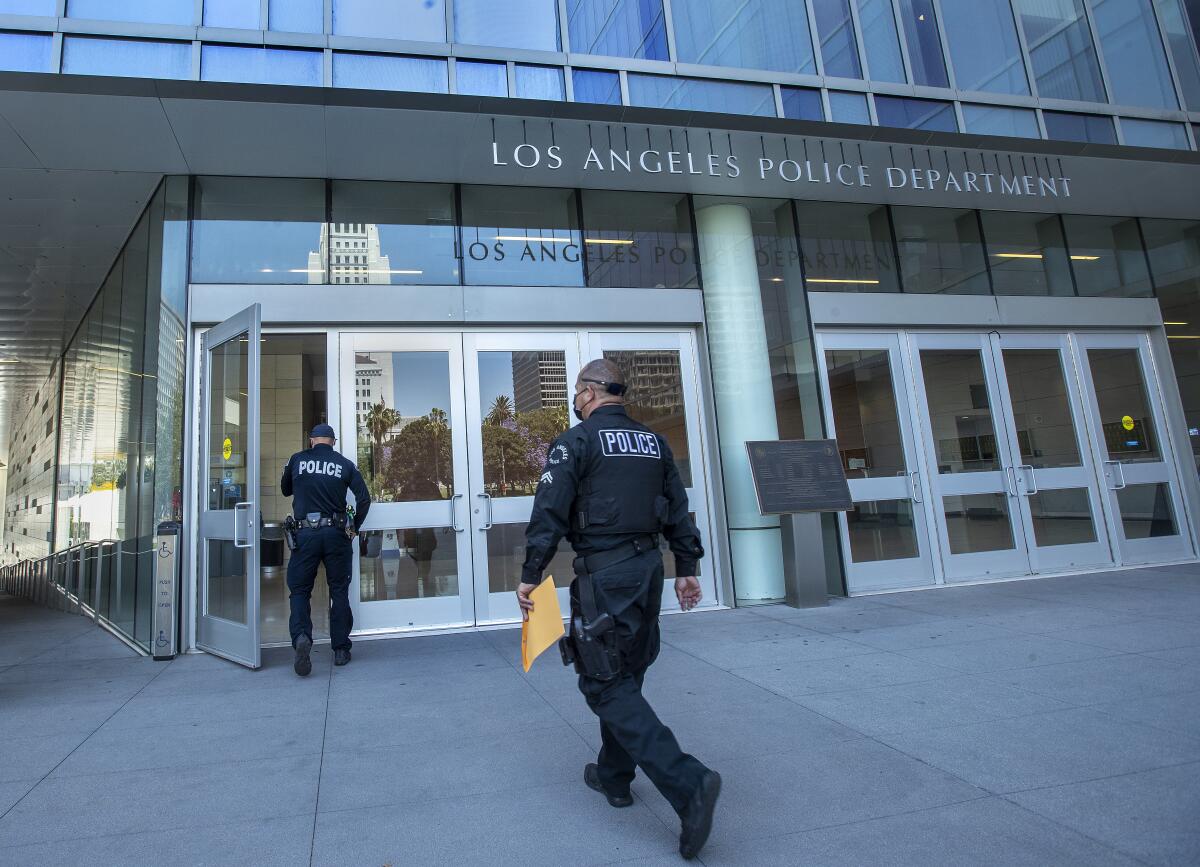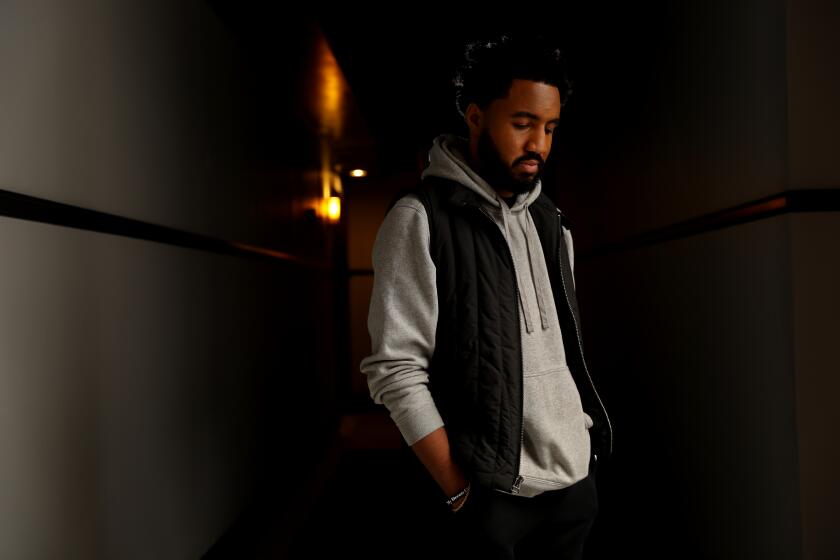LAPD should stop handling many non-emergency calls, police union says

- Share via
The Los Angeles Police Department’s largest employee union is looking to have officers stop responding to more than two dozen types of calls, transferring those duties to other city agencies while focusing on more serious crimes.
As part of its upcoming contract talks, the Los Angeles Police Protective League intends to tell city negotiators that it is willing to let other city departments or nonprofit agencies respond to calls about panhandling, illegal sidewalk vending, urinating in public, mental health episodes in which there is no threat of violence or criminal activity, and dangerous dog complaints in which “no attack is in progress.”
Such a shift would free up officers to focus more on violent crime, solve more cases and improve officer morale, the union said.
“Police officers are sent to too many calls that are better suited for unarmed service providers,” Craig Lally, the union’s president, said in a statement Tuesday.
Deon Jones’ legal battle to hold the LAPD accountable for wounding him at a 2020 protest has been long and arduous. The city has made it that way.
Councilmember Tim McOsker, who sits on the city’s powerful bargaining committee, said he looks forward to working with the union on the city’s program of “unarmed response.”
“On this list are calls for service that reasonably and safely don’t require an armed officer,” said McOsker, an attorney who represented the LAPD union for several years.
The proposal coincides with efforts by some council members to shift certain duties away from the LAPD, including traffic enforcement and nonviolent mental health calls. Two of the council’s newest members — Eunisses Hernandez and Hugo Soto-Martinez — called during last year’s election campaign for the city to move money out of the LAPD and into social services, such as mental health teams.
Hernandez, who defeated an incumbent backed by the LAPD union, sounded optimistic about the proposal, saying the city needs public safety systems that “prevent rather than react to harm.”
“I’m encouraged to hear officers of the LAPD take this first step towards joining in this vision, and I look forward to discussing how we can continue to reimagine our public safety system to prioritize unarmed, life-affirming alternatives to crisis response for Los Angeles,” she said in a statement.
A representative of Mayor Karen Bass sounded more hesitant about the proposed changes.
“Taken as a whole, this proposal would compromise public safety,” Bass spokesperson Zach Seidl said. “But we welcome discussion of proposals that would make our neighborhoods safer.”
Seidl said the mayor is finalizing her strategy for reducing crime, addressing homelessness and mental health crises, and improving trust between the LAPD and the community. During last year’s campaign, Bass promised to create a public safety office that would not involve police. Meanwhile, council members have been looking in recent months at putting $1 million into an Office of Unarmed Response and Safety.
The league has argued for months that the department is understaffed, having lost about 800 officers since the outbreak of COVID-19 in 2020. In its proposal, the union acknowledged that “certain types of calls for service may not necessitate an armed response.”
As a result, the union is willing to stop having LAPD officers head out to homeless encampment cleanups, unless a deployment request is made by a city agency. Officers would stop making most “welfare checks” requested by the public. And they would no longer tackle certain quality-of-life calls, such as illegal dumping, illegal fireworks, noisy parties and drinking in public.
Some of the types of calls listed in the union’s proposal are largely the purview of the Department of Transportation, including illegally parked cars and abandoned vehicles.
Cindy Chvatal-Keane, president of the Hancock Park Homeowners Assn., said she thinks the overall concept being advanced by the union is a good idea. But residents will need to know much more about who would take on the duties that the police union wants the LAPD to shed, she said.
“Who will be responding? And who are they responsible to? Will they be fully trained for what will come up and do they have experience?” she said. “We just want to make sure that whoever is going to be answering those calls is fully prepared for what they might find and how to deal with it.”
A decade of 911 calls to the LAPD reviewed by The Times helps explain the possibilities and challenges of reimagining police.
Advocacy groups have been calling for years for the LAPD to stop handling traffic enforcement, saying officers’ interactions with motorists too often end in fatal shootings by police. They renewed those calls after the death in January of Keenan Anderson, a teacher who was tased repeatedly by officers in Venice.
Akili, an organizer with Black Lives Matter-Los Angeles, told KNX Radio on Wednesday that his group will keep pushing for such changes at City Hall and in Sacramento.
“We want to remove them from traffic stops ... so that we don’t have Keenan Andersons, so that we don’t have armed police officers stopping us, particularly under a pretext, and then we wind up hurt, harmed or dead,” he said.
The police union signaled in its proposal that it is not willing to relinquish those duties. Although the group came out in favor of having other agencies respond to non-injury traffic accidents, it intends to retain traffic enforcement assignments overall, citing the city’s growing number of deaths involving cars, bicyclists and pedestrians.
The union’s proposal would need to go before the city’s Executive Employee Relations Committee, which is made up of the mayor and four council members: Paul Krekorian, Curren Price, Bob Blumenfield and McOsker. Any employment contract would ultimately require City Council approval.
Blumenfield, who heads the council’s budget committee, praised the union proposal, saying it would help the city develop a network of “trained crisis workers and community based responders.”
“In order to build this network out, dedicated city staff is needed to focus on this work and realize its transformative potential,” he said in a statement.
More to Read
Sign up for Essential California
The most important California stories and recommendations in your inbox every morning.
You may occasionally receive promotional content from the Los Angeles Times.













